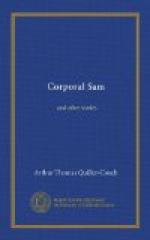The street was empty. From one of the doorways a voice called to him to come back. But he walked on, up the street and across the roadway to a green-painted wicket. It opened upon a garden, and across the garden he came to a flight of steps with an open door above. Through this, too, he passed and stared into a small room. On the far side of it, in an armchair, sat Corporal Sam, leaning back, with a hand to his breast; and facing him, with a face full of innocent wonder, stood a child—a small, grave, curly-headed child.
CHAPTER VIII.
‘I’m glad you done it quick,’ said Corporal Sam.
His voice was weak, yet he managed to get out the words firmly, leaning back in the wooden armchair, with one hand on his left breast, spread and covering the lower ribs.
The sergeant did not answer at once. Between the spread fingers he saw a thin stream welling, darker than the scarlet tunic which it discoloured. For perhaps three seconds he watched it. To him the time seemed as many minutes, and all the while he was aware of the rifle-barrel warm in his grasp.
‘Because,’ Corporal Sam pursued with a smile that wavered a little, half wistfully seeking his eyes, ’you’d ’a had to do it, anyway— wouldn’t you? And any other way it—might—’a been hard.’
‘Lad, what made you?’
It was all Sergeant Wilkes could say, and he said it, wondering at the sound of his own voice. The child, who, seeing that the two were friends and not, after all, disposed to murder one another, had wandered to the head of the stairs to look down into the sunlit garden shining below, seemed to guess that something was amiss after all, and, wandering back, stood at a little distance, finger to lip.
‘I don’t know,’ the corporal answered, like a man with difficulty trying to collect his thoughts. ’Leastways, not to explain to you. It must ‘a been comin’ on for some time.’
‘But what, lad—what?’
’Ah—“what?” says you. That’s the trouble, and I can’t never make you see—yes, make you see—the hell of it. It began with thinkin’—just with thinkin’—that first night you led me home from the breach. And the things I saw and heard; and then, when I came here, only meanin’ to save him—’
He broke off and nodded at the child, who catching his eye, nodded back smiling.
He and the corporal had evidently made great friends.
But the corporal’s gaze, wavering past him, had fixed itself on a trestle bed in the corner.
‘There was a woman,’ he said. ’She was stone cold; but the child told me—until I stopped his mouth, and made a guess at the rest. I took her down and buried her in the garden. And with that it came over me that the whole of it—the whole business—was wrong, and that to put myself right I must kill, and keep on killing. Of course I knew what the end would be. But I never looked for such luck as your coming. . . . I was ashamed, first along, catching sight o’ you—not—not ashamed, only I didn’t want you to see. But when you took cover an’ waited—though I wouldn’t ’a hurt you for worlds—why then I knew how the end would be.’




